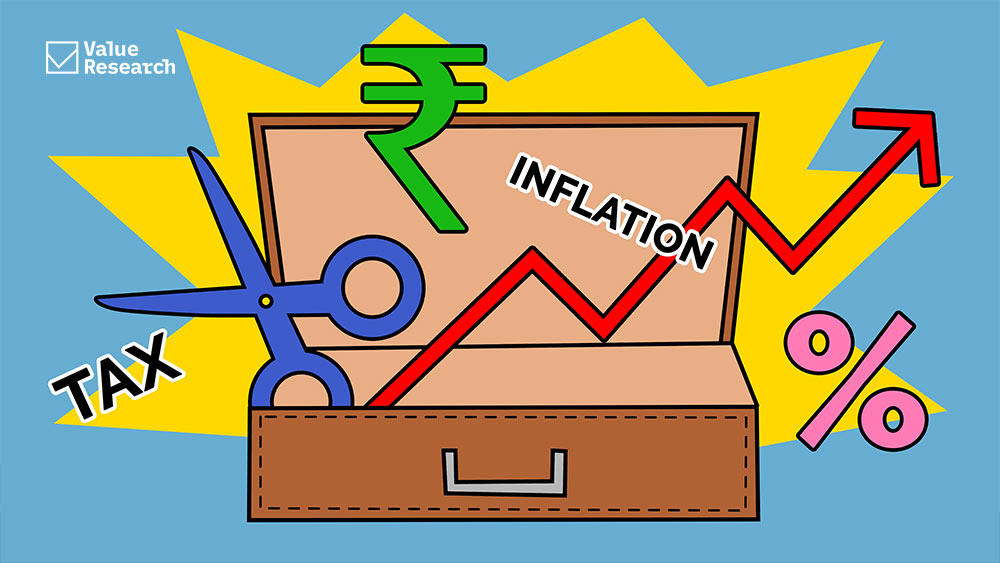
On a recent flight, I got talking to the person sitting next to me. I soon figured out that he was from Delhi and he figured out that I write on finance and economics to make a living. Given this, we started talking about that one favourite topic of Delhi wallahs - real estate. To my surprise, he was still gung-ho about real estate. "But prices have not gone anywhere in the last five six years. In fact, in large parts of the National Capital Region, they have fallen," I protested, hoping to build in some sense into him. "While there have been next to no capital gains if you had owned real estate as an investment over the last few years, you would have had to continue to pay expenses like property tax as well as the society-maintenance charges over and above the EMI if you had brought the home on a loan," I continued, hoping that the individual would listen to what I had to say.
"Oh, I have heard all that before," he replied very confidently. "But when I buy real estate, I am buying something tangible. I can see it. I can touch it. I can feel it. It's my money before my eyes."
"So?" I asked, briefly wondering why would anyone want to see, touch and feel an investment, instead of trying to figure out whether it was making money or not.
"So, I can leave behind a home for my sons and not just some pieces of paper, which is exactly what I would do if I were to invest in mutual funds. Or I would leave behind some digital entries if I were to invest in stocks," he explained.
I found this philosophical explanation rather weak, but I decided to tackle it in my own way. "That is interesting," I said. "But why do you exactly want to leave behind real estate for your progeny?"
"Oh. So that they have a home in these expensive times."
"Interesting. What makes you think that if you invest in stocks or mutual funds, your sons won't have a home to live in?"
"How will they have a home to live in if I buy stocks and mutual funds and not a home?" he asked rather perplexed.
"Well, by simply selling those investments and buying a home at an appropriate point of time, as and when they need it," I replied. "Also, they will have a choice to buy a home that they want to live in, rather than maintain and live in a home that you bequeathed to them."
"But what if they sell the investments and waste the money instead of buying a home," he said.
"Do you think they would do that? Have they shown tendencies like that?"
"To be honest, right now they are in their late teens and haven't shown any such tendencies," he replied. "But who knows how they will eventually turn out to be."
"So, you mean that right now you trust them, but you don't know how they will turn out to be in the future, and so you can't trust them."
"Yes."
"And if you leave behind a home to live in, they are unlikely to create any mess."
"Yes," he said with the smile of an all-knowing person, who had everything figured out.
"But even if you leave behind a home, they can sell the home and waste that money away," I tried to explain. "If you are not around, what will stop your sons from doing that?"
Now that was a point that the gentleman hadn't really thought about. And all he could say was, "Oh!"
The silence lasted a few seconds and the gentlemen retorted again, "So, what if they sell out, the maximum amount of money is always made in real estate."
"Oh, that is really not true. Typically, what happens in the case of real estate is that people only talk about the price it was bought for and the price it was sold for. And what we get as the difference is a very large number, and people automatically assume that a lot of money has been made. All of us have heard at least one such story. And the power of these stories is immense. No one goes about doing a detailed calculation. For example, no one bothers to account for the cost of maintaining the real estate over the years. No one talks about property tax that needs to be paid over the years."
"Hmmm."
"And most importantly, no one bothers to take into account the time value of money. If all that is done, the internal rate of return earned on real estate over the long term is pretty mediocre. It's just that most people do not know about the concept of the internal rate of return, which is the right way of calculating returns on any investment. Over and above that, there is never really enough data available to calculate the right return on investment in the case of real estate. All this basically leads people to assume that any investment in real estate generates a lot of money."
"But what about the population? You know as the population goes up, more people need housing and given that real-estate prices will always keep going up," he said with the confidence of a man who was back in the boxing ring.
"Well. Look at Delhi and how it has expanded in all directions. So, where exactly is the shortage of land? While, this logic might work for a city like Mumbai, it doesn't hold for other cities, where there is enough land going around and given this, cities are expanding in all directions. Also, the other point is about population growth. India has now reached a stage wherein in a few years, the new babies born will just about replace the people dying. Hence, the rate of increase in population will keep falling. These two things essentially make sure that the over the long term, the population argument will not hold."
This seemed to convince my co-passenger and he started to nod his head approvingly. Once he was done nodding, he smiled and asked, "But what about black money?"
Now, I did not have any answer for that question. I smiled and then looked out of the window into an ocean of darkness.








